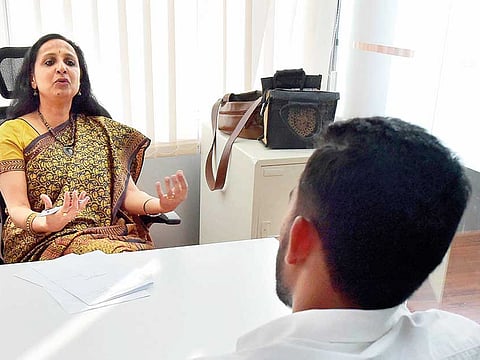Up to Dh11,000 aid for deserted Indian wives in UAE
Legal and psychological counselling also offered in marital dispute cases

Abu Dhabi: There are several support mechanisms offered to Indian women deserted by their husbands in the UAE including a financial aid up to $3000 (Dh11, 000), a senior official said.
From September 1, Indian missions in the UAE can disburse up to Dh11,000 to Indian women abandoned or cheated or abused by their spouses if they do not have any means for their livelihood, Dinesh Kumar, first secretary at the Indian Embassy in Abu Dhabi told Gulf News.
A marital counselling session at the Indian Community Welfare Fund (ICWF) in Dubai. Photo: Pankaj Sharma
This has become possible after the recent expansion of the scope of the Indian Community Welfare Fund (ICWF).
“If deserted Indian housewives have no source of income and no other means to sustain the livelihood, this fund can be made use of,” he said.
A high-level panel constituted by the Indian Ministry of External Affairs last week proposed to increase this fund, which is $2000 (Dh7,350) in developing countries, to $6000 (Dh22,000).
The panel has also proposed to impound or cancel the passports of the abusive NRI husbands who desert their wives.
Kumar said impoundment of passports is possible only when NRI husbands do not report to the courts in India where cases are filed against them.
“There is an official procedure to be followed in this,” he pointed out.
The summons from the court concerned in India has to be first sent to the Indian missions here though the Indian ministries of home affairs or law, he said.
“When we get summons through such proper channels, we get them delivered to the spouse here through the local authorities after forwarding it to the UAE Ministry of Foreign Affairs.”
He said often such summons are not sent in a proper way. “Many a time, the aggrieved people are not aware of the process. Sometimes they send us the request via email. We cannot take action in such cases and we inform them about the procedures.”
He noted that the missions are also providing legal and psychological counselling through the Indian Workers Resource Centre in marital dispute cases. “Sometimes our officials also personally talk to couples to settle their issues amicably.”
However, when there are complicated issues like the custody of children involved, the missions have to advise them to approach the local courts, he said.
The missions and the IWRC also conduct awareness campaigns about the rights of Indian women married to NRIs and also the ways to handle their issues. “We are posting all relevant information on our websites and also publicising them through social media,” said Kumar.
Answers to all the frequently asked questions by Indian women facing marital issues can be read at http://iwrcuae.in/FAQ.aspx
Sign up for the Daily Briefing
Get the latest news and updates straight to your inbox



